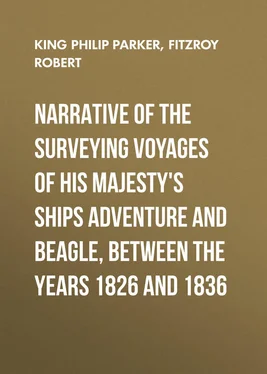Robert Fitzroy - Narrative of the surveying voyages of His Majesty's ships Adventure and Beagle, between the years 1826 and 1836
Здесь есть возможность читать онлайн «Robert Fitzroy - Narrative of the surveying voyages of His Majesty's ships Adventure and Beagle, between the years 1826 and 1836» — ознакомительный отрывок электронной книги совершенно бесплатно, а после прочтения отрывка купить полную версию. В некоторых случаях можно слушать аудио, скачать через торрент в формате fb2 и присутствует краткое содержание. Издательство: Иностранный паблик, Жанр: foreign_antique, foreign_prose, на английском языке. Описание произведения, (предисловие) а так же отзывы посетителей доступны на портале библиотеки ЛибКат.
- Название:Narrative of the surveying voyages of His Majesty's ships Adventure and Beagle, between the years 1826 and 1836
- Автор:
- Издательство:Иностранный паблик
- Жанр:
- Год:неизвестен
- ISBN:нет данных
- Рейтинг книги:3 / 5. Голосов: 1
-
Избранное:Добавить в избранное
- Отзывы:
-
Ваша оценка:
- 60
- 1
- 2
- 3
- 4
- 5
Narrative of the surveying voyages of His Majesty's ships Adventure and Beagle, between the years 1826 and 1836: краткое содержание, описание и аннотация
Предлагаем к чтению аннотацию, описание, краткое содержание или предисловие (зависит от того, что написал сам автор книги «Narrative of the surveying voyages of His Majesty's ships Adventure and Beagle, between the years 1826 and 1836»). Если вы не нашли необходимую информацию о книге — напишите в комментариях, мы постараемся отыскать её.
Narrative of the surveying voyages of His Majesty's ships Adventure and Beagle, between the years 1826 and 1836 — читать онлайн ознакомительный отрывок
Ниже представлен текст книги, разбитый по страницам. Система сохранения места последней прочитанной страницы, позволяет с удобством читать онлайн бесплатно книгу «Narrative of the surveying voyages of His Majesty's ships Adventure and Beagle, between the years 1826 and 1836», без необходимости каждый раз заново искать на чём Вы остановились. Поставьте закладку, и сможете в любой момент перейти на страницу, на которой закончили чтение.
Интервал:
Закладка:
During our communications with these visitors they conducted themselves peaceably, and made no attempt to pilfer, although there was some little roguery displayed by them in barter. One of the men having parted with all his disposable property, tendered one of his daughters, a fine girl of fourteen or fifteen years of age, for some mere trifle, and, being refused, became very pressing and importunate to close the bargain for the price that was jestingly offered; nor was it without difficulty that he was convinced we were not in earnest. They were as poor as the rest of their countrymen, very badly clothed, and possessing few skins to barter. Two of them exchanged their otter skin mantles for cotton shirts, which they continued to wear without complaining of cold.
As their visits lasted all day they always brought their food, consisting of the blubber of seals and porpoises. The method used by them in cutting it up is nearly similar to that adopted by the Esquimaux Indians, as described by Sir Edward Parry in his second voyage, and also resembles the process of the natives of King George's Sound, which I have described in the account of my survey of Australia (vol. ii. p. 140): a piece of blubber being held in the left hand, a corner of it is taken between the teeth, and it is then cut by a knife, held underhanded, into strips backward and forward, without passing the instrument entirely through: so that when the operation is finished the piece draws out into a long band, about an inch thick, formed by the connected strips. The whole affair from first to last is most offensive to the sight; and the countenance of the carver is beyond description, for his eyes being directed to the blubber, squint shockingly, and give his ugly face a hideous appearance. The strip of blubber is next divided among the party, each of whom proceeds to extract its oily juices by drawing it through his teeth and sucking it, after which it is warmed in the fire to facilitate its division into small pieces, which are swallowed or bolted without mastication. Morsels of this dainty food were given not only to the elder children, but even to infants at the breast.
On the 14th, while preparing to weigh, the Indians came on board and helped to heave in the cable, but without rendering us much real assistance. When the sails were loosed, the women in the canoes began to chatter and scream for fear we should carry off their friends, and their alarm was no sooner given than the deck was cleared of our visitors, who seemed to be quite as much frightened for their safety as the women were. In a few minutes afterwards we were proceeding to the southward, and first tried to anchor in a bay on the south side of Smyth Harbour, but finding the depth too great, I sent Lieut. Graves to sound behind an islet where there were indications of a place of shelter, but he returned unsuccessful. During his absence I went to a very narrow passage, which he had discovered, leading to a large channel or sound; but finding it intricate, I deferred trying to enter with the vessel until a more favourable opportunity should offer, and we returned to the place south of Warrington Cove, called Dighton Bay, where we anchored off a sandy beach in twenty fathoms, and secured the vessel by laying the kedge on the shore. This sandy beach was the first we had found in the eastern part of the Strait. The sand is quartzose, of a white colour, and being a novelty, rendered the place interesting. A stream, supplied by the ravines of Mount Maxwell, runs over the beach into the sea, and from it an abundant supply of excellent water may be obtained without difficulty.
We observed no quadrupeds; but, of the feathered tribe, we found woodpeckers, kingfishers, and woodcocks, and in the sheltered nooks several humming-birds were darting about the flowery underwood of berberis, fuchsia, and arbutus. In the tide-way, at the narrow passage, the sea teemed with fish; over which hovered corvorants and other sea-fowl, preying upon the small fry that were trying to elude their voracious enemies, the porpoises and seals, thousands of which were seen sporting about as we proceeded on our way. Whales were also numerous in the vicinity, probably because of an abundance of the small red shrimp, which constitutes their principal food.
I went again to examine the passage, and the tide being against us, we were obliged to pull close to the western shore to benefit by the partial eddies, otherwise we could not have proceeded until the turn of the tide.
These narrows, named 'Shag' Narrows, from the quantity of birds there so called by seamen, are not a hundred yards wide. The south end is fronted by an island, from whose summit, about four hundred feet high, I hoped to obtain a good view southward, and after passing the narrows we landed and reached the summit. While looking around at the view, and preparing the theodolite, a woodcock started up from the long grass and walked away so leisurely, that Mr. Tarn nearly succeeded in striking it with a stick. This bird afforded us a name for the station, which we found to be at the northern side of a large basin, ten miles wide, and six long, terminated at its south end by a channel leading to the open sea, but crowded with islands and rocks. A deep inlet or chasm in the land, at the N.W. corner of this basin, was filled with masses of floating ice, broken from an enormous glacier.
After obtaining all the bearings and embarking, we pulled three miles to the westward, and took a round of angles at Point Cairncross, the south-west point of Field's Bay, and again another set at the south head of Icy Sound, near Dinner Cove, where we found a very convenient anchorage for small vessels. Through Icy Sound we found some difficulty in penetrating, as the channel was much obstructed by ice.
Three miles within this sound the rocky shore became more precipitous, and at two miles farther, where the width across was not more than one hundred and fifty yards, the rocks rise perpendicularly on each side to the height of seven or eight hundred feet. Beyond this remarkable part the channel opens out to a basin about half a mile in diameter, bounded by a sloping glacier, from which immense masses of ice broke off frequently, and falling with a noise like the discharge of a ship's broadside, threw up the foaming water with terrific violence.
As we entered the basin, we were startled by a sudden roar, occasioned by the fall of one of these avalanches, followed by echoes which reverberated round the basin and among the mountains. We remained for half an hour afterwards waiting for another fall, but were not gratified. Several were heard at a distance, probably high up the sides of the glacier. The examination of Icy Sound occupied us until dark, when we returned to the schooner.
During our absence, Indians had again visited the Adelaide, the greater number of whom were strangers. We had also seen a party in a canoe close to Mount Woodcock, who were striking seal, and too intent upon their object to pay much attention to any thing else.
Конец ознакомительного фрагмента.
Текст предоставлен ООО «ЛитРес».
Прочитайте эту книгу целиком, купив полную легальную версию на ЛитРес.
Безопасно оплатить книгу можно банковской картой Visa, MasterCard, Maestro, со счета мобильного телефона, с платежного терминала, в салоне МТС или Связной, через PayPal, WebMoney, Яндекс.Деньги, QIWI Кошелек, бонусными картами или другим удобным Вам способом.
Читать дальшеИнтервал:
Закладка:
Похожие книги на «Narrative of the surveying voyages of His Majesty's ships Adventure and Beagle, between the years 1826 and 1836»
Представляем Вашему вниманию похожие книги на «Narrative of the surveying voyages of His Majesty's ships Adventure and Beagle, between the years 1826 and 1836» списком для выбора. Мы отобрали схожую по названию и смыслу литературу в надежде предоставить читателям больше вариантов отыскать новые, интересные, ещё непрочитанные произведения.
Обсуждение, отзывы о книге «Narrative of the surveying voyages of His Majesty's ships Adventure and Beagle, between the years 1826 and 1836» и просто собственные мнения читателей. Оставьте ваши комментарии, напишите, что Вы думаете о произведении, его смысле или главных героях. Укажите что конкретно понравилось, а что нет, и почему Вы так считаете.












